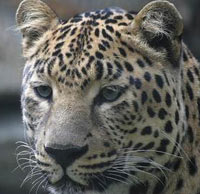Roza Khutor to bring Persian leopard back to Russia’s Caucasus
World Wildlife Fund and the company Roza Khutor, which conducts the construction of the ski resort in Sochi (a resort city in Russia’s South) announced the launch of a unique project titled “The Recovery of the Persian Leopard in the Caucasus.”

The project is being implemented with the support of the Russian Ministry for Natural Resources and the Russian Service for Nature Control. The rehabilitation of the Persian leopard in the Caucasus will become the first large environmental project of WWF Russia, funded by the Russian business. Beeline, a major cellular operator in Russia, joins Roza Khutor in the project.
The leopard was widely spread in the Caucasus not so long ago. The animal’s habitat covered almost all mountainous territories. However, its population was considerably reduced at the end of the 19th and in the beginning of the 20th centuries due to extensive extermination of the animal. Only several individuals had been left in the Caucasus by the 1950s. Severe winter conditions (deep snow and lack of hoofed animals) and the ongoing extermination of predatory animals minimized the leopard population even further. The animal could hardly be spotted anywhere in the region in the 1960s and the 1970s.
In Russia the leopard has been preserved in remote areas of the Eastern Caucasus. However, the remaining group of animals with undermined population structure is not viable there.
The goal of the WWF and its project partners is to bring the Persian leopard back to Russia. According to the project, leopards from various European zoos are going to be transported to their new habitat. Specialists will set up open-air enclosures for their maintenance and breeding and perform a set of measures to adapt the animals to the natural conditions of the Caucasus.
“Our goals are ambitious. We are happy that our idea to return the leopard to Russia’s Caucasus has received support from the scientific community, the government and the Russian business that will actually fund the implementation of the program, Igor Chestin, the Director of WWF Russia said.
“The project on the recovery of the Caucasian panther attracted our attention with its uniqueness,” the General Director of the company Roza Khutor, Nina Zagorulko said. “Such cases of saving animals from extinction have not been practiced before anywhere of the world. We like the idea of becoming the first, not only in business and sports. In addition, the existence of the Caucasian panther is considered to be a positive sign for the entire ecological system of the region. This is a very important factor for the development of the ecological tourism in Russia’s South, which complies with the concept of the Roza Khutor resort.
The construction of open-air enclosures, to which leopards will be brought from many European zoos, will be started at the National Park of Sochi on May 24. The cubs born in the enclosures will become the basis to recreate the Russian population of the leopard in the Caucasus. The animals are to be released in the wild world during 2008-2013.
Subscribe to Pravda.Ru Telegram channel, Facebook, RSS!





